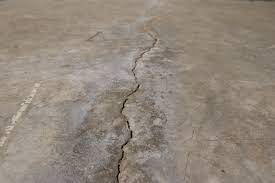Water seeping through your concrete slab can be a cause of great concern for homeowners. Not only does it affect the structural integrity of your home, but it also leads to mold growth, dampness, and a host of other costly issues. At Vic Lekas Detection, we understand the importance of identifying and resolving water leaks quickly. Here, we’ll explore some of the common causes of water seeping through your concrete slab and what you can do to prevent or address it.

1. Cracks in the Concrete Slab
One of the most common causes of water seepage through concrete slabs is cracks. Over time, concrete can shrink, settle, or experience wear and tear, leading to cracks. These cracks create pathways for water to infiltrate the slab, especially during heavy rainfall or when the ground around the slab becomes saturated.How to Fix It:
- Inspection & Repair: If you notice cracks in your slab, it’s crucial to have a professional inspect the area. They will use sealing techniques to fill the cracks and prevent water from entering.
- Slab Re-leveling: If the cracks are due to uneven settling, re-leveling the slab may be necessary to prevent further damage.
2. Poor Drainage Around the Foundation
Improper drainage around your home can lead to water accumulating near the foundation, which can eventually seep into the concrete slab. This is especially problematic in areas with heavy rainfall or poor soil drainage. If the soil surrounding the foundation is not properly sloped, water may pool against the slab and find its way inside.How to Fix It:
- Gutter Maintenance: Ensure that gutters and downspouts are clear of debris and direct water away from the foundation.
- Regrading: The ground around your home may need to be regraded to direct water away from the foundation, ensuring proper runoff.
3. Rising Groundwater Levels
When the water table in the ground rises due to prolonged rainfall or flooding, it can force water up through the concrete slab. This is particularly common in homes built on low-lying or flood-prone areas, where groundwater pressure increases and finds its way through the slab.How to Fix It:
- Sump Pump Installation: Installing a sump pump in your basement or crawl space can help prevent water from entering your home when groundwater levels rise.
- Waterproofing the Slab: Waterproofing the slab with an effective membrane or coating can create a barrier to rising groundwater.
4. Faulty Plumbing or Leaking Pipes
Sometimes, water seepage isn’t caused by external water sources but rather by internal plumbing issues. Leaking pipes under or within the concrete slab can result in water leaking up through the slab. Common culprits include damaged water supply lines, sewer pipes, or irrigation systems.How to Fix It:
- Pipe Inspection: Professional plumbers can conduct a leak detection service to identify the source of the leak. Once the leak is found, the damaged pipe will need to be repaired or replaced to stop the water flow.
- Relining: If the pipes are too damaged to repair, pipe relining may be an option to restore their functionality without tearing up the slab.
5. Condensation Under the Slab
Condensation can occur when warm, moist air comes into contact with the cooler surface of the concrete slab. This is especially common in areas with high humidity or poor ventilation. Over time, the moisture condenses and seeps into the slab, causing dampness and water damage.How to Fix It:
- Improved Ventilation: Increasing ventilation in areas such as crawl spaces or basements can help reduce moisture buildup under the slab.
- Vapor Barriers: Installing a vapor barrier beneath the slab can help prevent moisture from the soil from seeping through and condensing on the surface.
6. Improperly Mixed Concrete
In some cases, water seepage through concrete slabs can be caused by poor-quality concrete that was improperly mixed. If the concrete was too wet during the pour, it can create voids or weak spots in the slab that allow water to penetrate over time.How to Fix It:
- Concrete Replacement: If poor-quality concrete is the problem, it may be necessary to remove and replace sections of the slab. A professional contractor will ensure that the new concrete is mixed properly and poured at the correct consistency.
